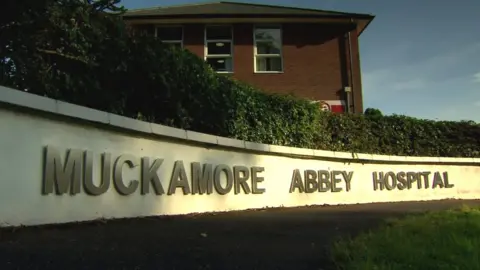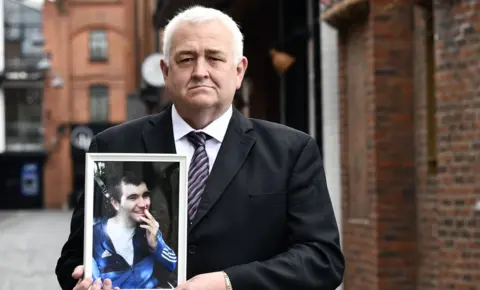Muckamore Inquiry: Campaigner Glynn Brown criticises 'Poundland mentality'
 BBC
BBCThe campaigner who was instrumental in securing the Muckamore Inquiry has accused its chairman of running the probe with a "Poundland mentality".
Glynn Brown helped expose the abuse of Muckamore Abbey Hospital patients after finding out his son had been assaulted.
Mr Brown is among several relatives who object to making formal statements to a law firm appointed by the inquiry.
But the chairman has refused families' requests to use their own lawyers, saying the process must be independent.
The Muckamore Inquiry is being chaired by Tom Kark KC, one of the UK's most senior barristers.
On Wednesday morning, Mr Kark made a statement to address campaigners' concerns about methods of gathering evidence from patients' relatives.
"The importance of using independent witness statement takers is that they act independently of the interests of any specific party," Mr Kark explained.
"There is an element of independence in such a process which would be lost if the statement taking is relinquished to the firm representing the witnesses."
The chairman also defended his decision to ask patients' families to make their statements before they have access to all the available medical records regarding their loved ones' stay in Muckamore.
Mr Kark said the proceedings would be significantly delayed "if we wait for every document or note relating to every patient involved in this inquiry".
'Cheaply as possible'
But Mr Brown, who leads the Action for Muckamore (AFM) campaign group, said: "Tom, I think, has the Poundland mentality.
"He's always mentioning that he's responsible to the public purse and he's always wanting to get it done swift," he told the BBC's Evening Extra programme
"I understand that he's keen to progress it quickly and I understand he's keen to do it as cheaply as possible.
"However, we've bought into a public inquiry that we expect to be robust and thorough."
AFM and its fellow campaigners in the Society of Parents and Friends of Muckamore (SPFoM) are both represented by Phoenix Law solicitors.
Members of both groups have so far refused to give statements to Cleaver Fulton Rankin (CFR), the Belfast commercial law firm appointed by the inquiry to record statements.
However it is understood other Muckamore relatives are willing to engage with the solicitors appointed by the inquiry and say they continue to have faith in the process.
What is the Muckamore Inquiry about?
The families of patients spent a long time campaigning for a public inquiry into the abuse of their loved ones in the hospital, which caters for disabled adults with severe learning difficulties.
Many relatives did not even know that their loved ones had been abused until Mr Brown, whose son is a former patient of the hospital, demanded access to internal CCTV footage.
The Police Service of Northern Ireland (PSNI) then reviewed that footage and said it contained evidence of hundreds of crimes on just one ward over the course of six months.
In 2020, the then health minister Robin Swann praised the campaigner, saying: "Mr Brown's determination was central in exposing the truth about Muckamore."
Over the past few years, several members of the hospital staff have been arrested and questioned about abuse allegations in what has become the largest police investigation into vulnerable persons' abuse that has ever taken place in Northern Ireland.
 Pacemaker
PacemakerWhy have some patients' families objected to the inquiry's rules?
Mr Brown explained that families were very concerned about giving evidence without knowing the full details of what happened to their relatives in Muckmore.
He said some witnesses discovered their loved ones had been taken to hospital "20-odd times" without family members being informed, and only found out when they got access to medical notes.
"We're not going to make the same mistake as others and just ramstam into a Poundland inquiry, just for the sake of expediency," Mr Brown said.
"I only get one shot at this with this inquiry and I want it to be precise and accurate and done relentlessly, to expose everything that went on."
In a letter to the inquiry chair last week, Mr Brown said the families had an "intense level of mistrust" against officialdom and "will not be coerced into compiling statements without prior access to all relevant discovery".
Mr Brown told Evening Extra the families were "very, very keen to make our statements" but he added they were "traumatic stories".
He explained that they wanted to use their own, trusted legal team to compile their evidence.
"It's not easy just to sit down in front of a stranger and tell your story," he said.
"Families do not feel they cannot unburden themselves to any Tom, Dick or Harry."
Why has the chairman refused the families' requests?
In his statement, Mr Kark spoke about the need for "independence" in the statement-taking process and of the need to protect ongoing criminal investigations into patient abuse.
He explained that if the minister had decided to wait until prosecutions were complete, the inquiry would have not started for years.
So, in order to allow the public inquiry to run concurrently with the police investigation, the inquiry team agreed to a "Memorandum of Understanding (MoU)" with police and prosecutors regarding witness evidence that might be important to criminal proceedings.
"In my view, handing over the role of taking witness statements to a private firm representing those same witnesses, could risk compromising my duties under the MoU and a further significant legal challenge to the continuation of the inquiry," Mr Kark said.
In relation to concerns about retraumatising patients' families, Mr Kark said all solicitors taking statements for the inquiry were required to undergo "vulnerable witness training".
In response to AMF's concerns that families might be the only witnesses not permitted to choose who they made their statements to, Mr Kark said his "intention in relation to all individual members of staff accused of wrongdoing is that they will also be required to complete their statements either with CFR or the inquiry's own team".
The chairman indicated that if he allowed the families to use their own solicitors, it would be very difficult to prevent accused health workers from insisting that they also make their statements to their personal solicitors.
Regarding organisations which will be asked to testify to the inquiry, such as health authorities, Mr Kark said: "Organisational statements of a formal nature fall into a different category and I want to retain some flexibility as to how those are taken, but for individuals accused of bad behaviour the same rules will apply as I am applying to the Phoenix Law clients."
Mr Kark also defended his timetable of asking the families to give their evidence before they had access to all medical documentation.
He said he wanted to prevent the inquiry being delayed or "swamped with material, only a fraction of which may in fact be required".
The chairman added: "I have to protect the integrity of this inquiry. I have a duty to act fairly to all and to ensure the progress of the inquiry."
